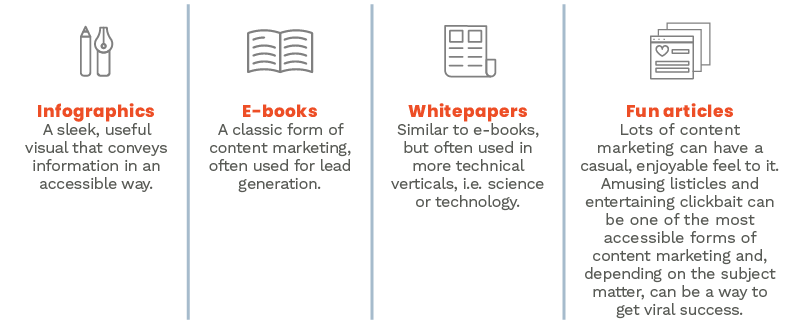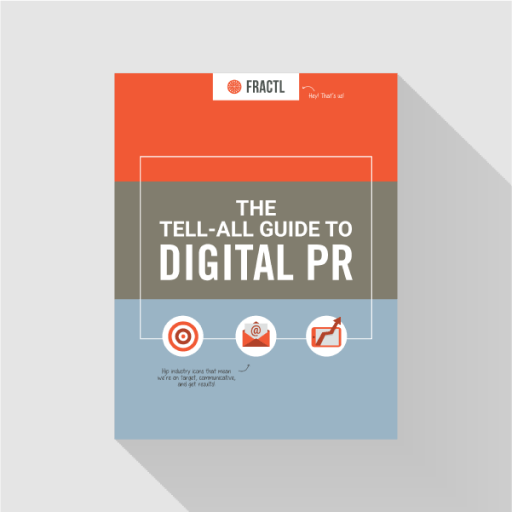Content surrounds us. Everywhere you look, you see buzzwords and catchphrases: content marketing and create quality content and content is king. The trouble is that, without clear definitions and strategies, content can become a meaningless concept.
Sometimes, defining content can seem like an easy task. We see blog posts or resource guides and think content. However, limited definitions and understanding of “content” can lead to a tendency for content creation to occur in a vacuum, often without a clear content strategy or a thorough understanding of what content marketing is. It’s important to remember that even website graphics, product descriptions, and mission statements are content.
You may think “having a strategy for my content means I’m content marketing.” But, in reality, the two concepts aren’t interchangeable. While content strategy and content marketing overlap, it’s important for your brand to differentiate between the two and use both in creating content that serves your users while appeasing the gods of SERP.
What We Talk About When We Talk About Content Strategy
Simply put, your content strategy is the guide to everything you create. It lives below the surface of your content, driving it, always ready to be referenced by you and your team. You need strategic thought behind why you create the content you create, the guidelines your content will follow, a calendar of when it will be created, who will create, who will update it, and the KPIs by which you will judge it.
Let’s consider all the crucial elements that should comprise your content strategy. To do so, you should answer a series of questions.
Why Are You Creating Content?
The word why is never spoken enough in the world of marketing (unless someone brought their toddler to the meeting). It needs to be spoken more: Why are you creating content? For what purpose?
Is it to educate an audience on a broader subject than just your brand? Is it to create brand authority? Are you offering resources? Explaining your products and services? Breaking down the selling points of your company? All the above?
Do not move forward with any content reason until you know why you’re creating it. This step cannot be skipped, as the rest of your process hinges on it.
Who Will Create Your Content?
This might be a simple answer, particularly if you’re a small company or flying solo. In many cases, you will be working long nights to write the content yourself. In other cases, you’ll be hiring freelancers, building a team internally, or identifying your dream team of collaborators.
While you might think you know the answer to this one, it’s still crucial to give it weight. Remember that it’s always best when you can identify an expert to create content on their subject of authority.
When Will You Create the Content?
Relatively simple, but important to ask. In many situations, your best option is to build a content calendar that outlines the upcoming weeks and months — sometimes covering the entire next year. Use tools like Google Trends to identify cycles and seasons, along with auditing your own website’s historical traffic and considering when your competitors typically publish their content.
While you don’t necessarily need a calendar in order to create a successful content strategy, you’ll probably be a lot happier if you do create one.
How Will You Keep Your Content On-Brand?
Your content on your site should feel cohesive. This cohesion creates trust from a reader and improves both the user engagement and authority of your site. Furthermore, your SEO rankings will be improved by consistent, intelligent content.
Looking for a start on your content guidelines? A great place to start is with the search engines themselves. Here are some tips from Bing on building quality content.
Of course, you’re not done yet. Unless your content strategy incorporates a time machine, you’ll need to conduct ongoing auditing and revising to keep content fresh and relevant. Leading us to the last step of an effective content strategy:
Who Will Maintain Your Content?
Who will be the one to both monitor performance and, as needed, respond to it? Content is not a static concept. It must be ever-evolving, adapting to the market and to your own successes and failures.
Even with the strongest strategy, some content will not succeed immediately. This is why you must build a maintenance plan into your content strategy, accounting for continually adjusting to performance and KPIs.
But What About Content Marketing?
Now that we’ve defined content strategy and outlined its key components, it’s time for the good stuff: content marketing.
For the uninitiated, content marketing is any marketing strategy that uses high-quality on-page content to engage audiences and potential customers, often resulting in links from major websites, increased leads, and improved SEO.
What are some examples of good content marketing?
To paraphrase Walt Whitman, content marketing contains multitudes. It can range from a whitepaper to a massive viral campaign. Here are a few of the most commons versions: infographics, e-books, whitepapers, and fun content.
Of course, as mentioned before, good content marketing is not created in a vacuum. It requires the kind of strategy outlined above.
Okay, But What’s the Difference Between Content Strategy and Content Marketing
The answer is simple: content strategy is the thought and research put into establishing an effective content marketing campaign. Content marketing is the campaign itself, which comes after the strategy.
These will overlap, of course. Your content strategy should fuel and guide your content marketing, just as your content marketing—and what you learn from it—continues to develop and improve your strategy.
Don’t Try Marketing Without Strategy; Don’t Bother Strategizing Without Marketing
You need both content marketing and content strategy to succeed.
Without a strategy, the content on your site won’t be user-friendly or helpful to your readers. The strategy is needed to stay on-brand, to capture a voice, and to release content at the ideal time. Meanwhile, content marketing is what you need to elevate your strategy into generating leads and boosting your search rankings.
It might take a lot of work, but it’s a relatively straightforward concept. So what are you waiting for? Get out there and start creating the content strategy you need to achieve your goals with an effective content marketing campaign.






